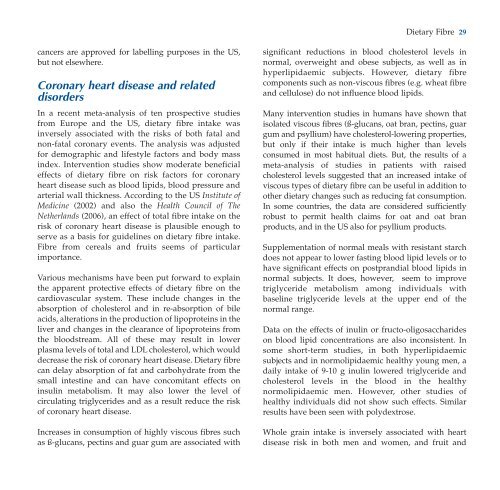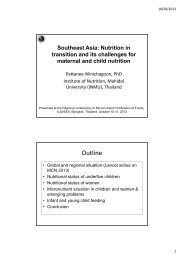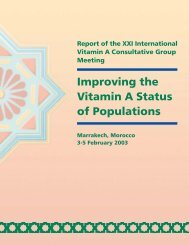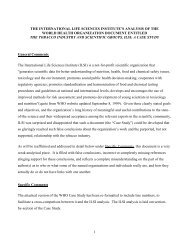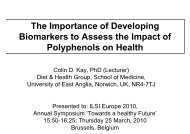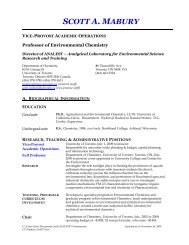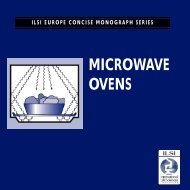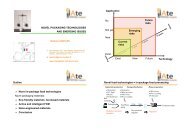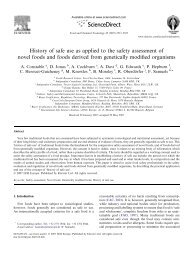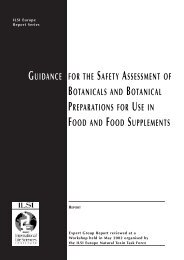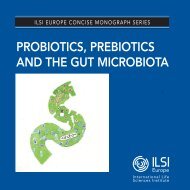Dietary Fibre - ILSI Argentina
Dietary Fibre - ILSI Argentina
Dietary Fibre - ILSI Argentina
Create successful ePaper yourself
Turn your PDF publications into a flip-book with our unique Google optimized e-Paper software.
<strong>Dietary</strong> <strong>Fibre</strong> 29<br />
cancers are approved for labelling purposes in the US,<br />
but not elsewhere.<br />
Coronary heart disease and related<br />
disorders<br />
In a recent meta-analysis of ten prospective studies<br />
from Europe and the US, dietary fibre intake was<br />
inversely associated with the risks of both fatal and<br />
non-fatal coronary events. The analysis was adjusted<br />
for demographic and lifestyle factors and body mass<br />
index. Intervention studies show moderate beneficial<br />
effects of dietary fibre on risk factors for coronary<br />
heart disease such as blood lipids, blood pressure and<br />
arterial wall thickness. According to the US Institute of<br />
Medicine (2002) and also the Health Council of The<br />
Netherlands (2006), an effect of total fibre intake on the<br />
risk of coronary heart disease is plausible enough to<br />
serve as a basis for guidelines on dietary fibre intake.<br />
<strong>Fibre</strong> from cereals and fruits seems of particular<br />
importance.<br />
Various mechanisms have been put forward to explain<br />
the apparent protective effects of dietary fibre on the<br />
cardiovascular system. These include changes in the<br />
absorption of cholesterol and in re-absorption of bile<br />
acids, alterations in the production of lipoproteins in the<br />
liver and changes in the clearance of lipoproteins from<br />
the bloodstream. All of these may result in lower<br />
plasma levels of total and LDL cholesterol, which would<br />
decrease the risk of coronary heart disease. <strong>Dietary</strong> fibre<br />
can delay absorption of fat and carbohydrate from the<br />
small intestine and can have concomitant effects on<br />
insulin metabolism. It may also lower the level of<br />
circulating triglycerides and as a result reduce the risk<br />
of coronary heart disease.<br />
Increases in consumption of highly viscous fibres such<br />
as ß-glucans, pectins and guar gum are associated with<br />
significant reductions in blood cholesterol levels in<br />
normal, overweight and obese subjects, as well as in<br />
hyperlipidaemic subjects. However, dietary fibre<br />
components such as non-viscous fibres (e.g. wheat fibre<br />
and cellulose) do not influence blood lipids.<br />
Many intervention studies in humans have shown that<br />
isolated viscous fibres (ß-glucans, oat bran, pectins, guar<br />
gum and psyllium) have cholesterol-lowering properties,<br />
but only if their intake is much higher than levels<br />
consumed in most habitual diets. But, the results of a<br />
meta-analysis of studies in patients with raised<br />
cholesterol levels suggested that an increased intake of<br />
viscous types of dietary fibre can be useful in addition to<br />
other dietary changes such as reducing fat consumption.<br />
In some countries, the data are considered sufficiently<br />
robust to permit health claims for oat and oat bran<br />
products, and in the US also for psyllium products.<br />
Supplementation of normal meals with resistant starch<br />
does not appear to lower fasting blood lipid levels or to<br />
have significant effects on postprandial blood lipids in<br />
normal subjects. It does, however, seem to improve<br />
triglyceride metabolism among individuals with<br />
baseline triglyceride levels at the upper end of the<br />
normal range.<br />
Data on the effects of inulin or fructo-oligosaccharides<br />
on blood lipid concentrations are also inconsistent. In<br />
some short-term studies, in both hyperlipidaemic<br />
subjects and in normolipidaemic healthy young men, a<br />
daily intake of 9-10 g inulin lowered triglyceride and<br />
cholesterol levels in the blood in the healthy<br />
normolipidaemic men. However, other studies of<br />
healthy individuals did not show such effects. Similar<br />
results have been seen with polydextrose.<br />
Whole grain intake is inversely associated with heart<br />
disease risk in both men and women, and fruit and


